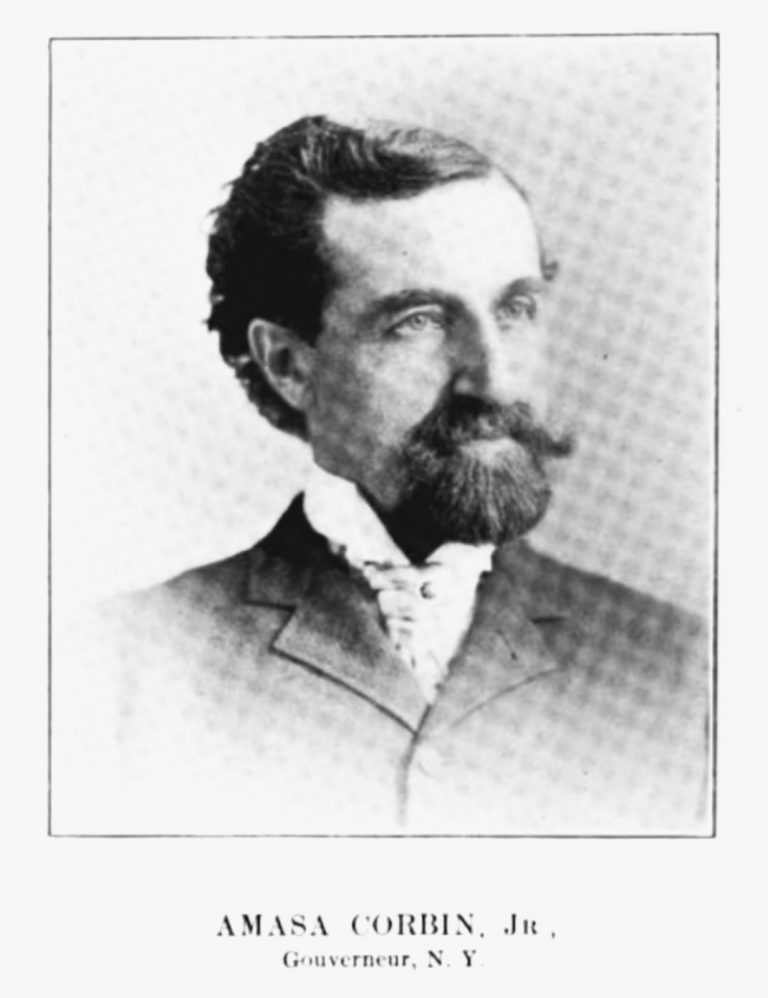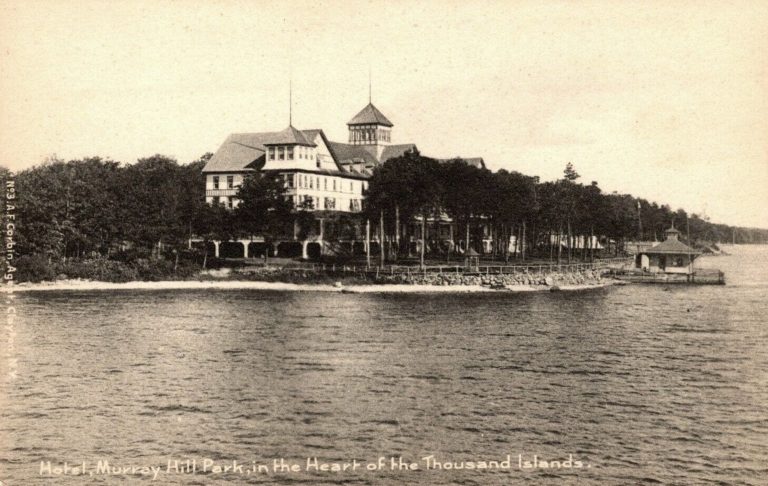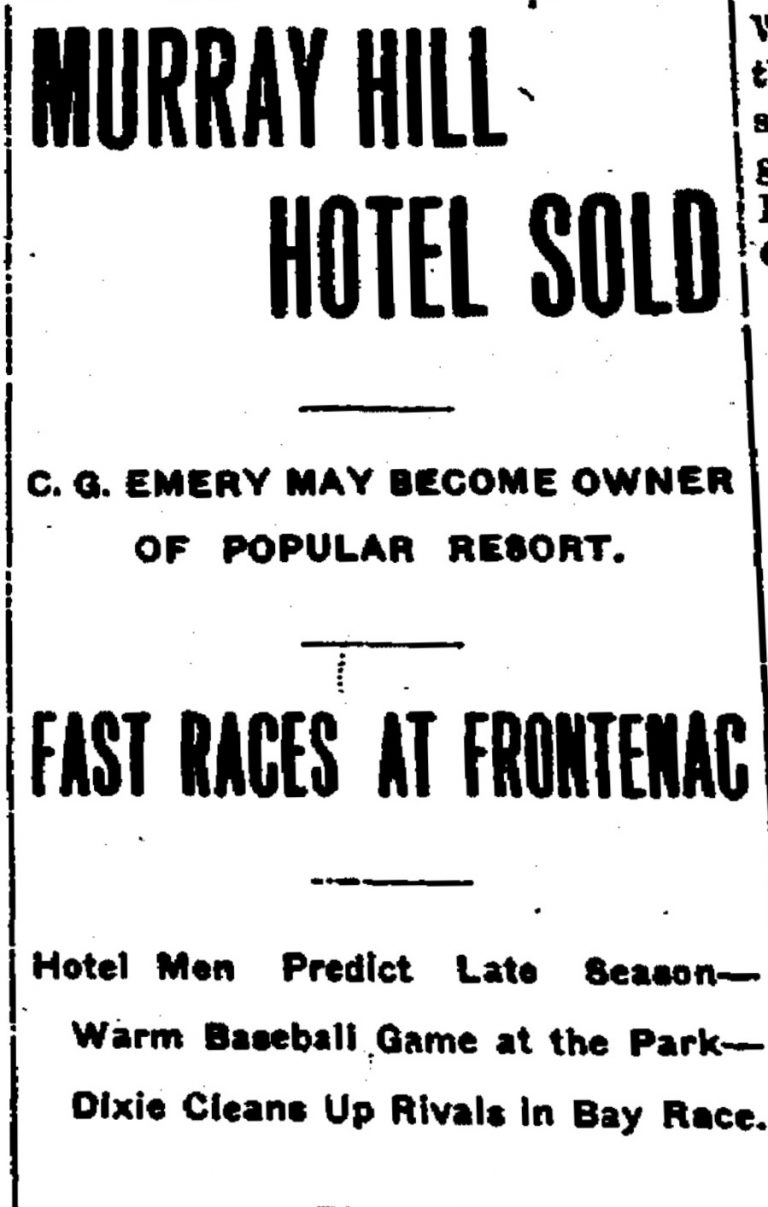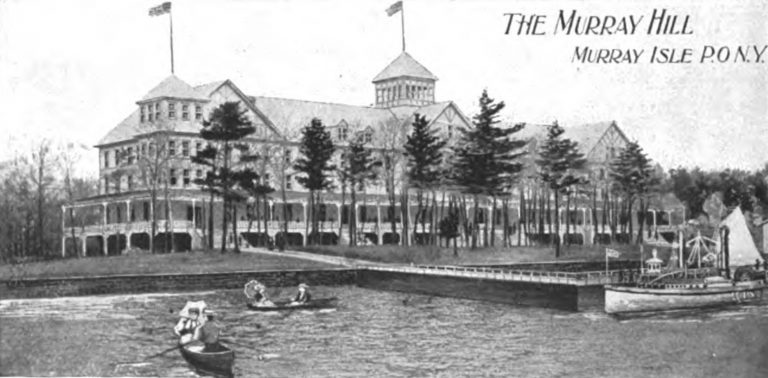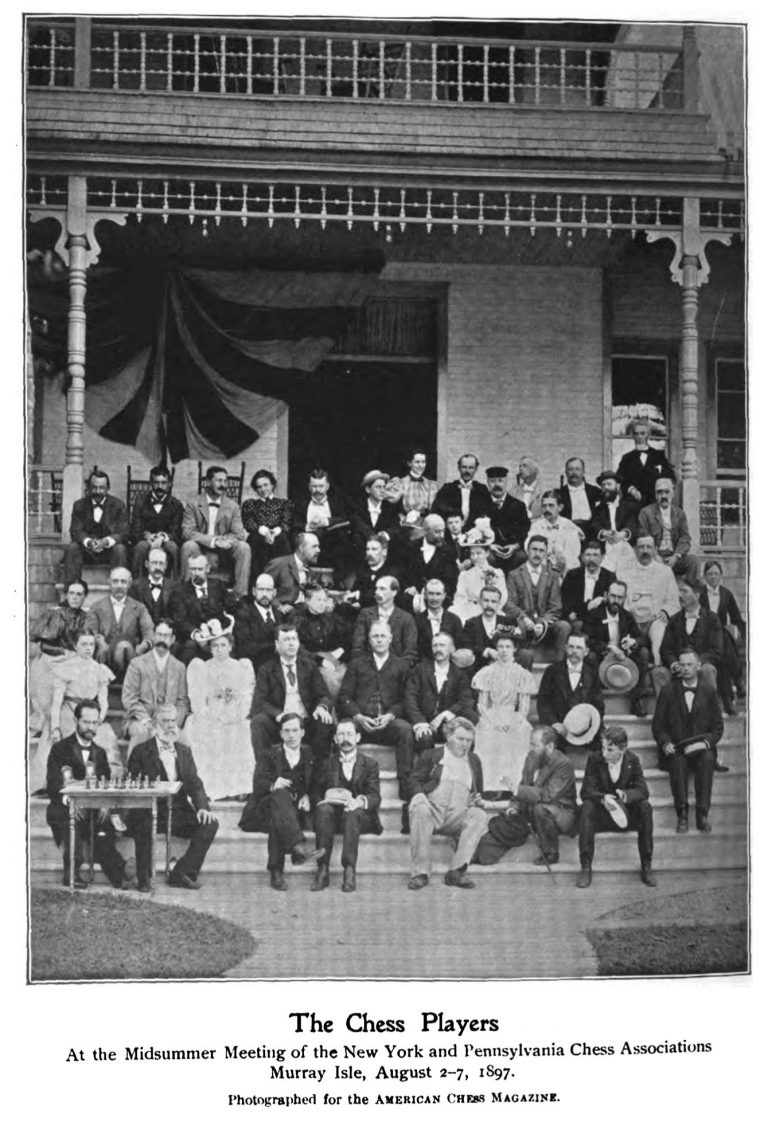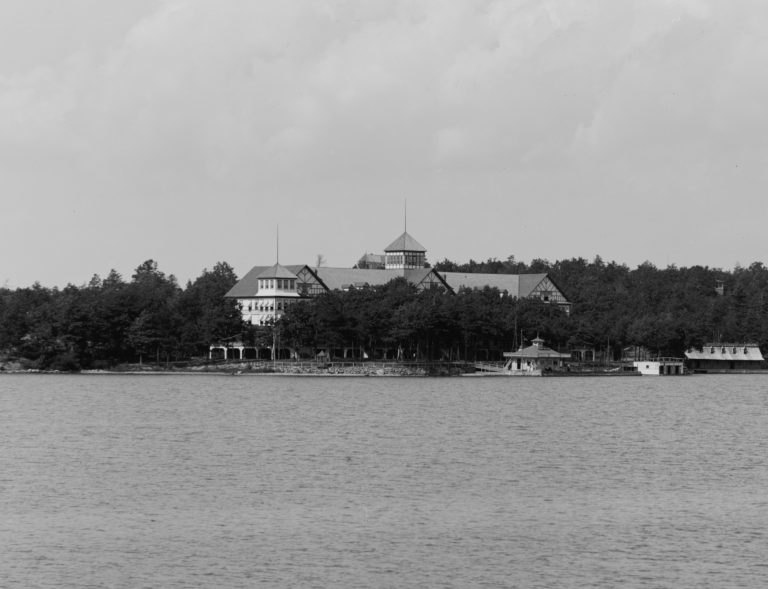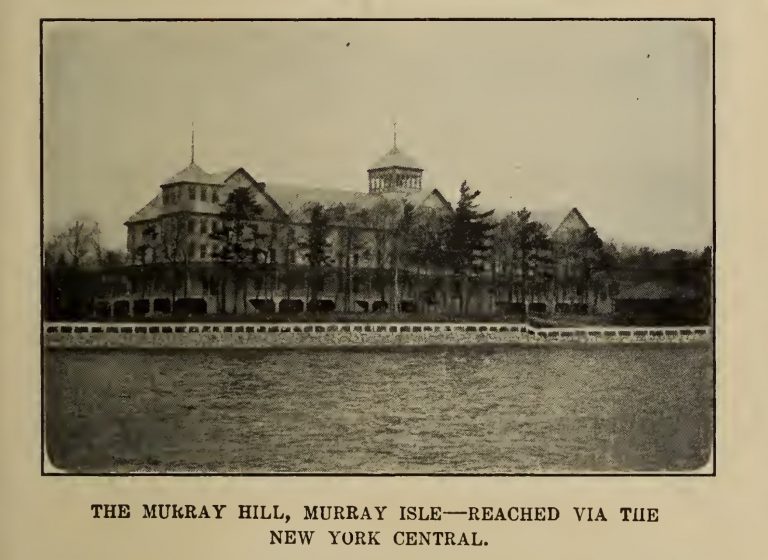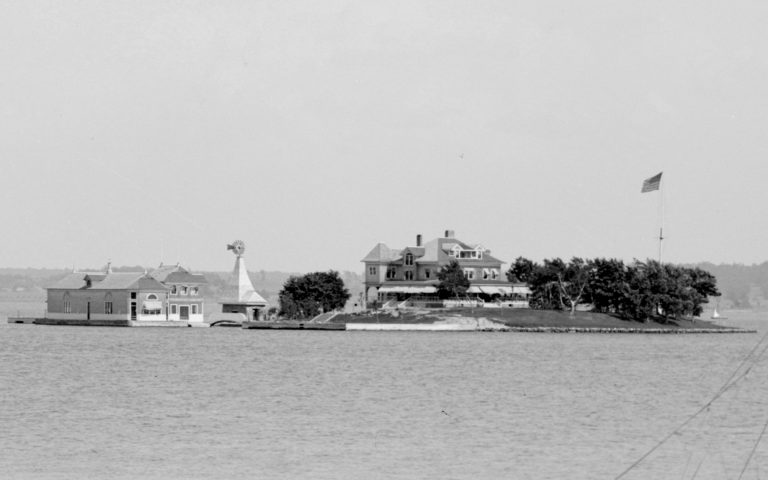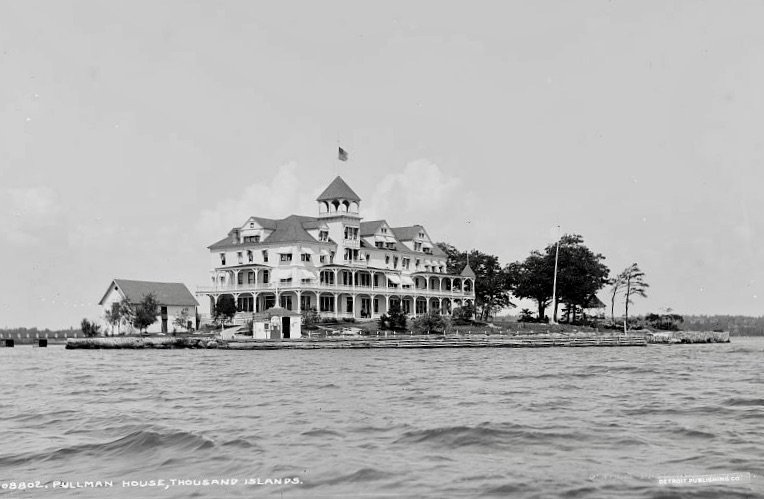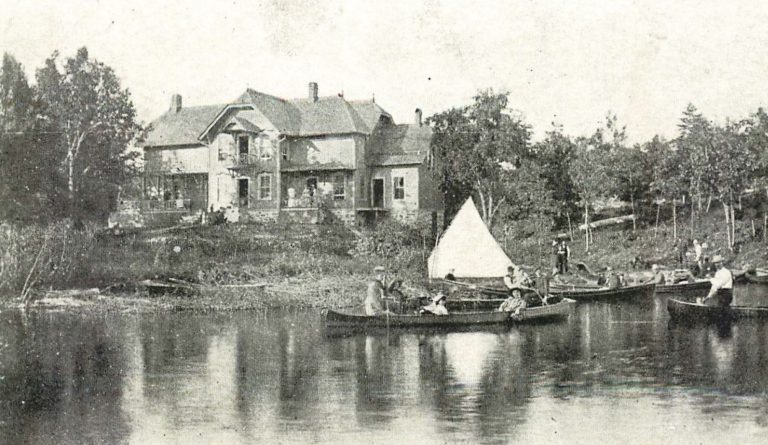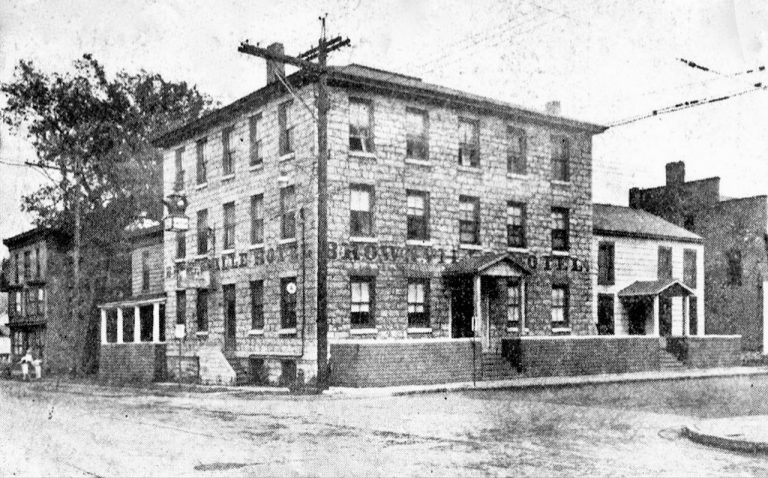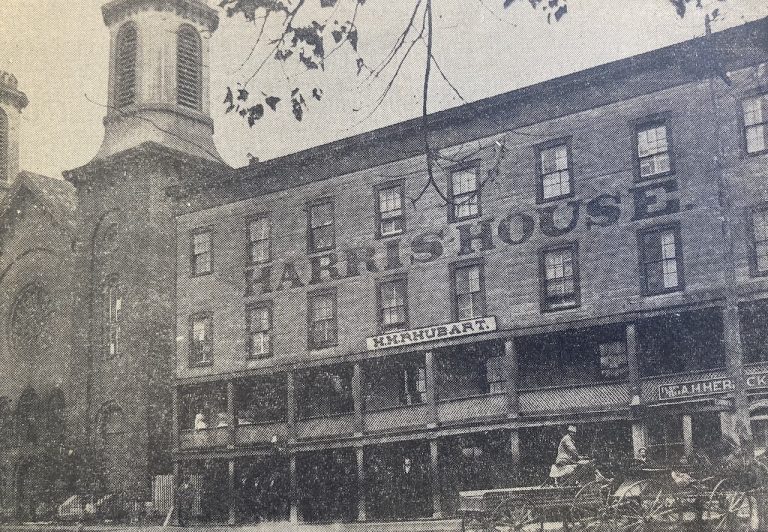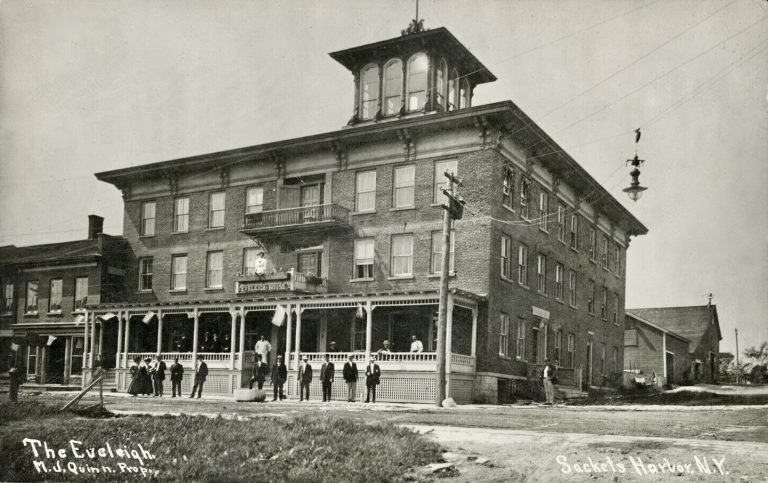Amasa Corbin, Jr., of Gouverneur Organizes Thousand Islands Develop Co. and Builds Murray Hill Hotel on Murray Isle in 1895.
In 1893, Gouverneur native Amasa Corbin, Jr. began plans for what would become the Murray Hill Hotel when he organized the Thousand Islands Investment Company and purchased Murray Isle just off Wellesley Island. Like other development corporations that had sprung up before it, the intent was to subdivide the property into 1225 lots with an area known as Oak Point to be used for building the Murray Hill Hotel. While a few hundred lots were initially sold, most of the activity occurred once the hotel was built – although three decades later when the hotel was razed the lots were said to have been not worth the money spent.
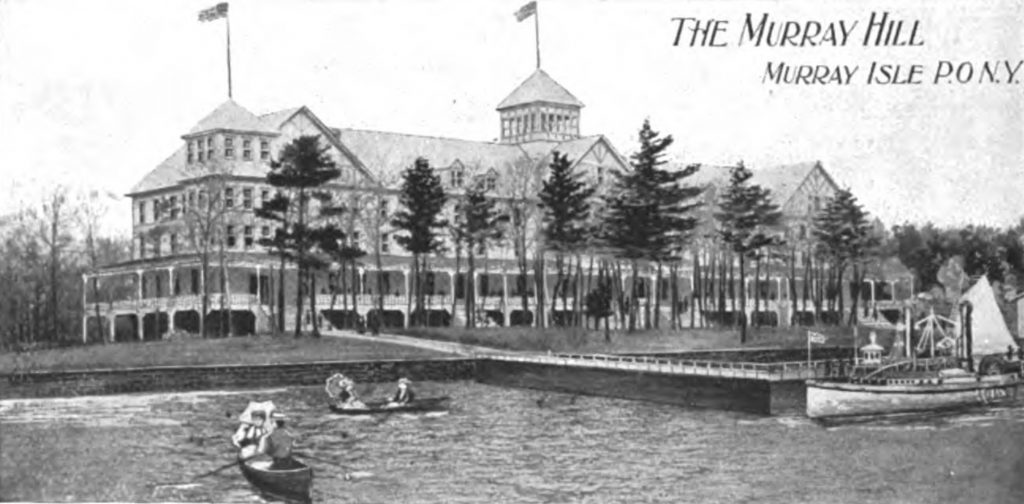
The first thing built under the development was the large boathouse in 1893. In 1895-96 the Murray Hill Hotel was constructed and completed, introduced to the public for the first time with a grand reception and banquet on Wednesday evening, July 22 of 1896. An advertisement for the hotel three years later described it as–
Elegantly furnished and perfectly equipped. Largest dining room, Ladies’ billiard room, office and parlor on the St. Lawrence. Electric lights, bowling alley, express, telegraph and post-office. Piazza unequaled.
O. H. Foster, Proprietor
W. P. Chase, Manager
At the time, the Murray Hill Hotel had plenty of competition right within the Clayton area with the likes of the Frontenac on Round Island, the Pullman House off Grenell Island, the Columbian Hotel in Thousand Island Park, and the Manatauk Hotel just outside Clayton, not to mention the number of hotels in Clayton itself. Murray Hill Hotel needed to find different ways of luring people, whether it be with conventions, such as the New York Chess Association’s midsummer meeting for a week in July, 1900, or simply by offering half-rate deals to all residents of St. Lawrence and Jefferson Counties and to all commercial travelers in Northern New York in 1901.
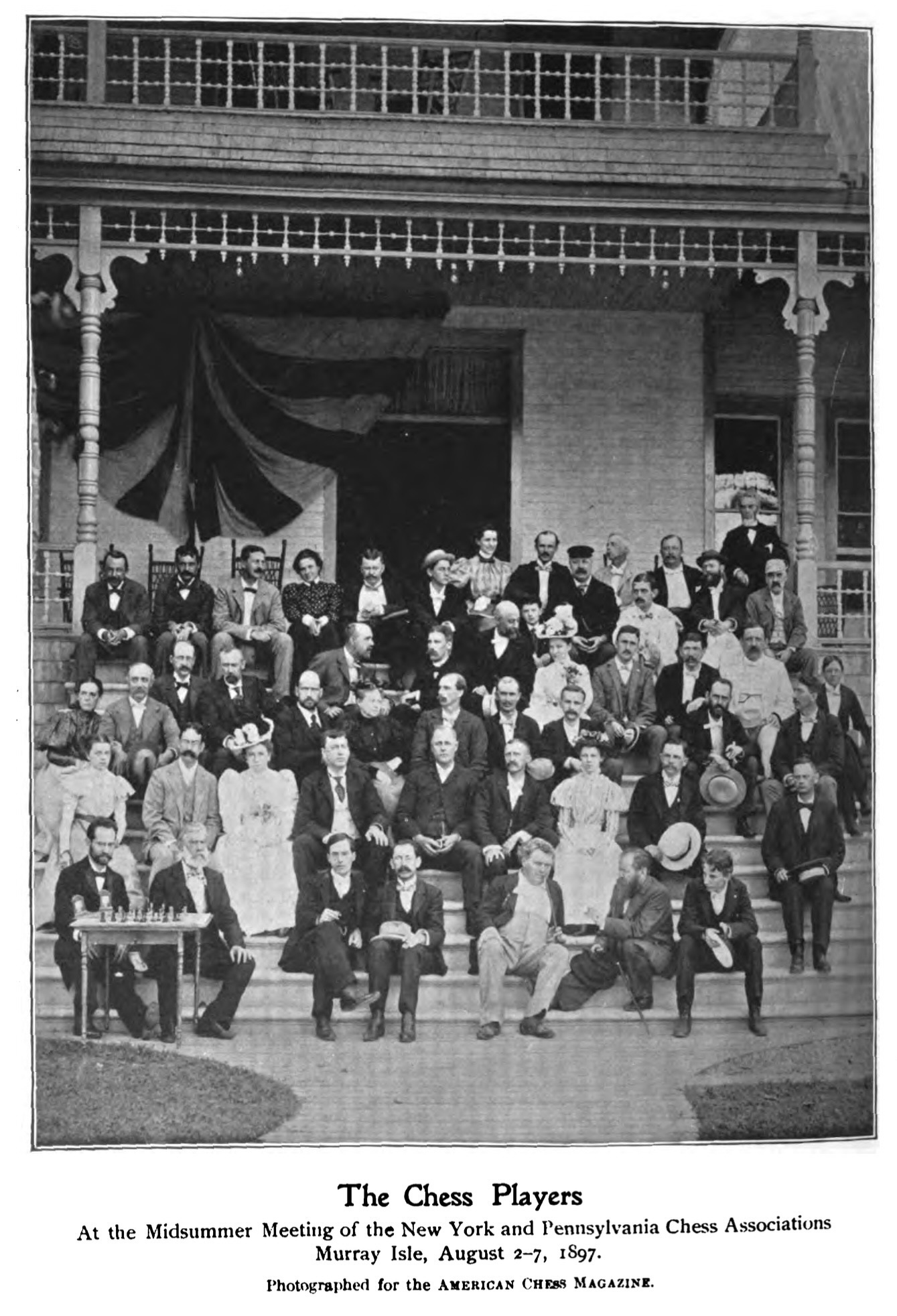
In August of 1906, Charles G. Emery of New York, proprietor of the Frontenac, was thought to have been the likely winner of an auction sale for the Murray Island Hotel. C. G Trussel, manager of the Frontenac, along with Robert Reddy, were given a tour from top to bottom by Amasa Corbin who was still the primary stockholder. According to the Watertown Daily Times, “Although Mr. Corbin was averse to talking, he admitted that there was a strong probability of Mr. Emery’s acquiring the property.”
The deal, however, never materialized and the following year Amasa Corbin planned to spend $15,000 to improve Murray Hill Hotel. The following year, he became the outright owner after securing all the stock in what was then the Murray Hill Hotel Co. Two years later, he offered up Murray Hill Hotel, worth $100,000, as a prize for the winner of a grand international handicap sweepstake race (horse racing.) After initial interest, the handicap seemed to have dropped from sight as reported in the April 24, 1909 Watertown Daily Times.
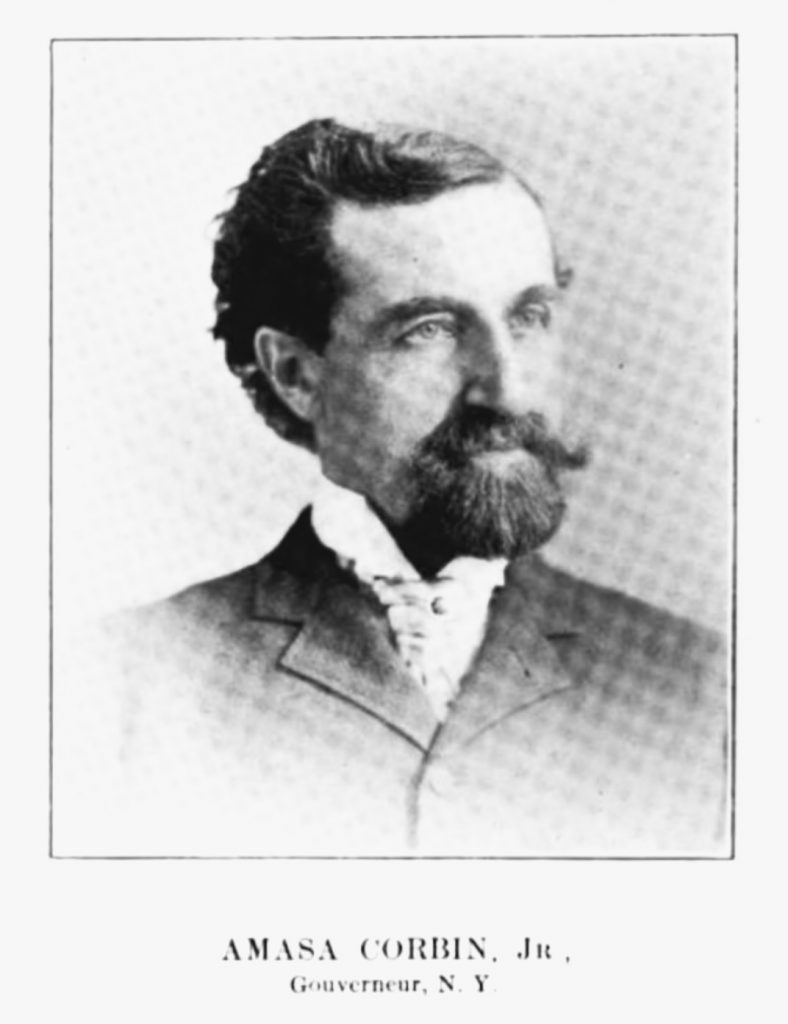
Corbin managed the hotel himself during the 1911 season, but his health began to fail and he looked to sell it the following season, this time to H. G. Martin of Spofford, Texas. The deal didn’t materialize and the opening of Murray Hill Hotel was in doubt until the Columbia Hotel fire occurred. Efforts were made to negotiate a deal to have the Murray Hill Hotel become, temporarily, home to the “New” Columbian, but its proprietors initially said it was cost prohibitive. Corbin then worked directly with the negotiations and on July 13th announced his hotel would be opened at once.
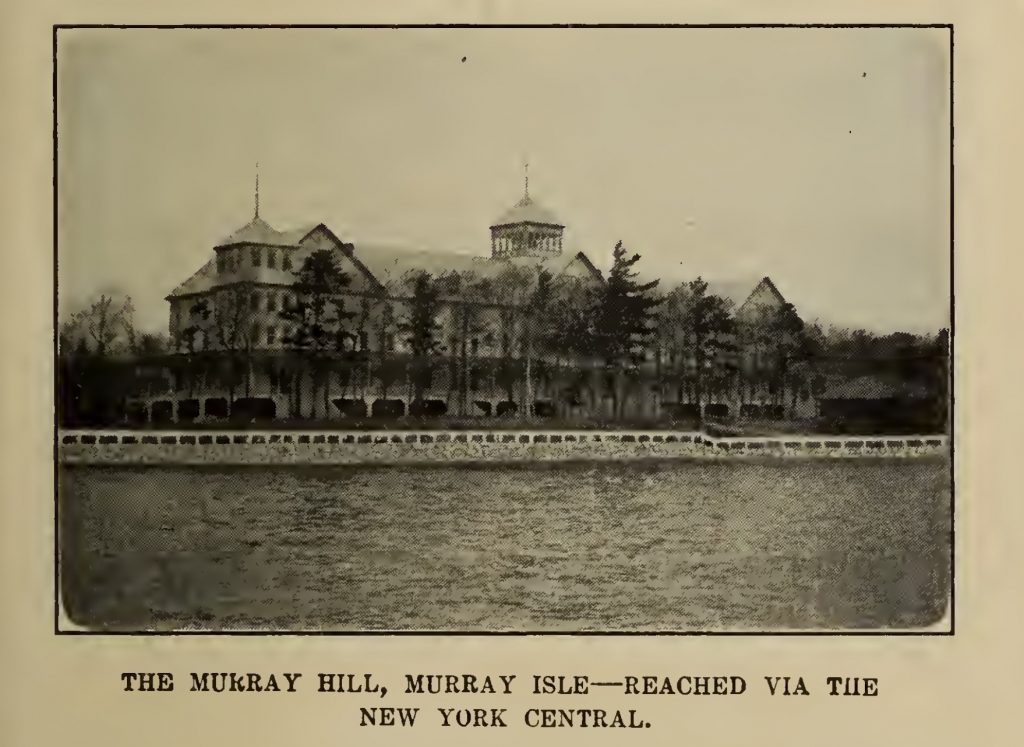
Three months later, Corbin sold the Murray Hill hotel to L. Lee Williams of Dallas, Texas, for $120,000, just five months before his passing on February 18th, 1913, in his adopted hometown of Joplin, Missouri, where he had business interests. The sale contradicts the information given in his obituary published in the Watertown Daily Times which reads, in part—
A telegram was received here this afternoon, announcing the death of Amasa Corbin, Jr., in Joplin, Mo., where he was on a business trip. Mr. Corbin left here several weeks ago for Texas and later went to Joplin, where he had extensive business in lead and zine mines.
Mr. Corbin was born in Gouverneur, Dec. 31, 1843, a song of the late Amasa and Phoebe Foster Cobin. Early in life he became president of the Bryant, Stratton & Corbin business college of Bridgeport, Conn., being at the head of the institution in 1864 and 1865. In 1866 he was at teh head of the Eastman business college in Poughkeepsie. He was educated in the schools of Gouverneur and did his first teaching at the age of 18 years.
About 20 years ago Mr. Corbin organized the Thousand Island Development Co., and purchased Murray Island, near Clayton. Lots were sold and the Murray Hill Hotel was built. Mr. Corbin owned the hotel at the time of his death.
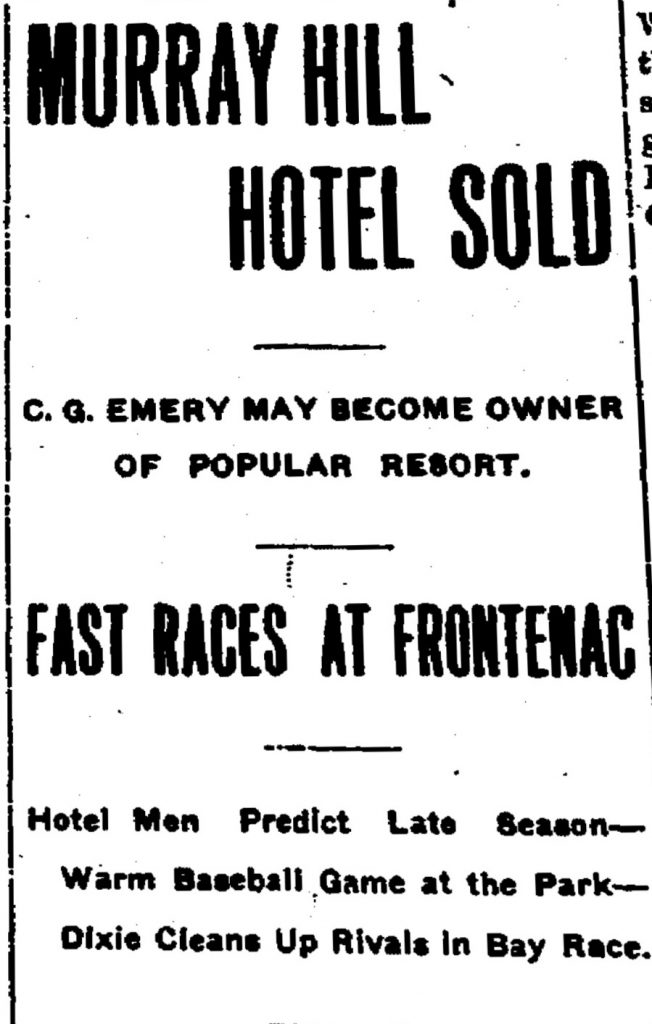
In 1913, Dr. J. Thurmond became, according to one report, the new owner, and in another report, part of a conglomerate and sent to manage Murray Hill Hotel. The hotel would remain open for the most part over the next dozen years, but a revolving door of ownership and management continued until the hotel was razed in 1925. As printed in the Daily Times, July 11, 1925—
The Murray Hill Hotel, which at one-time bid fair to become the most popular summer resort on the St. Lawrence, is being torn down, work being begun the past week by a gang of contractors from the river towns. It was only 30 years ago this summer that the work of building the huge hostelry was begun and in those years, it enjoyed the reputation of being the gem of the Thousand Islands.
The hotel when built was destined to be the scene of many brilliant social affairs, but even as early as 1893, two years before the formation of the hotel company, the Thousand Islands Investment Company had built a large boat house on the shore, with a floor space of sufficient size to permit dancing.
One thing for which the hotel was especially noted was the high class of music which was furnished each summer for the entertainment of its patrons. Some of the most noted singers and instrumental artists were secured to play and sing during the summer months, and no trouble nor expense was spared to secure the very best that could be had.
Its last season in operation was 1924 when the building was vacated, with furnishings, and left to the elements. Its demise was attributed, in part, to the popularity of the automobile and the growing popularity of hotels on the mainland as a result.
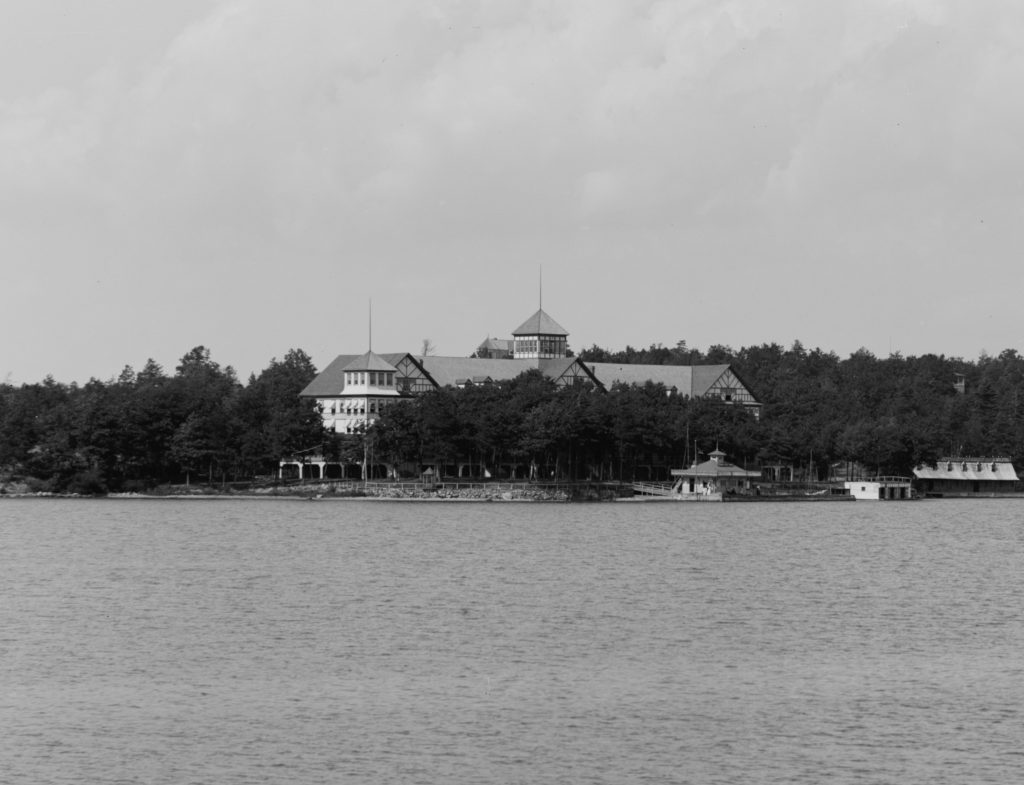
The Curious Case Of Riker’s Thousand Islands and Riker’s Murray Hill Hotel
The article below was originally published in the New York Times and subsequently re-published throughout numerous newspapers including the Watertown Daily Times.
It’s an interesting, if not altogether incredulous, story that speaks to the norms of society and its views toward mental health. Though no additional information could be found with regards to what the ailment was, it does, in some way, come across as almost comedic if looked through the lens of Arsenic and Old Lace and “Teddy Roosevelt” Brewster’s role, if it weren’t really true.
Mr. Riker was committed to Bellevue for observation with the belief he was insane in 1902. Evidently, he was released and a year later his former wife tried to have him committed again, but a magistrate denied the request.
A CRAZY SCHEME
New Yorker who thought himself owner of Thousand Islands
Insanity in a novel form
William H. Riker made elaborate plans to establish great summer resort at Murray Hill Park, with steamships, telegraph and telephone lines of his own—had been guest at Murray Hill Hotel.
Believing himself to be incalculably wealthy, intent on buying everything that is for sale, and possessed of the idea of establishing at the Thousand Islands the finest summer resort in the world, William H. Riker of 222 West Twenty-Fourth St has negotiated during the last fortnight for the expenditure of several million dollars.
He has given checks to bind contracts and made cash purchases amounting in is estimated to between $4,000 and $5,000. The peculiar conduct of the man resulted in his commitment to Bellevue hospital for examination as to his sanity.
Mr. Riker is 53 years old and the son of William B. Riker, who for many years was proprietor of Riker’s Drug Store at Sixth Avenue and Twenty-Second Street. The elder Mr. Riker is about 83 years old and retired from business about eight years ago.
During the summer the father and son, with the latter’s 14-year-old daughter, lived at Murray Hill Hotel, Thousand Islands. About two weeks ago the son began making frequent trips to New York. A week later there were surprising discoveries.
The father and Senator John J. Adams of Canton, Adams & McIntyre, at 25 Broad St., his counsel, learned that the son had been trying to purchase everything in the city, and that he had bought thousands of worth of house furnishings, gambling paraphernalia, field glasses, table ware and other things, and had them sent to “Riker’s Murray Hill Hotel, Thousand Islands.”
In the younger Mr. Riker’s baggage, which he left at the office of his attorney, were found more than 50 sheets of note paper of all kinds, hotel stationary, telegram blanks and the like, on which were the memoranda of his transactions. One of these bore the notion that he had become the owner of the Thousand Islands. The Murray Hill Hotel, the notes said, already was his, and negotiations were pending for the purchase of the Pullman mansion, a private house on Pullman Island.
It was the intention of Mr. Riker to connect all of the islands by steamship, telegraph and telephone lines of his own. As a nucleus for the steamship line, five launches had been purchased by Riker from a man named White. On these a check for $100 had been given, and White had been instructed to send the boats to the Thousand Islands at the end of the week. Mr. Adams ordered that the boats be not sent and obtained the return of the check.
The plan of Mr. Riker, according to other notes in a valise, was to incorporate a company for the control of the Thousand Islands, with himself at its head. The stockholders were to be guaranteed a 10 percent dividend.
The young Mr. Riker advertised his “Riker Murray Hill Hotel” extensively in several New York papers. The advertisements read in this way:
“Rikers’ Murray Hill Hotel, Murray Isle, Thousand Islands, N.Y., stands for One Long Round of Pleasure.
It’s ‘Hot Stuff,’ too.‘Our House’ is heated; lovely throughout.No shivering mornings ‘In Ours.’ Nay I Nay I You see it’s cold up here among the Thousand Islands, both morning and night, and ‘out of sight,’ the heat as well as the blazing camp Fires, ‘in evidence’ are ‘not so bad to take, ‘but say, from about 10 a.m. to oh bedtime, it’s the most charming climate in the world, wether it’s sizzling or Freezing in New York, et al.
You pay only for your board and lodging. Boats, guides, oh and old thing you want, all Free, * * * Better wire your orders at once at Our Expense * * * ‘Are You Wid Us?’”
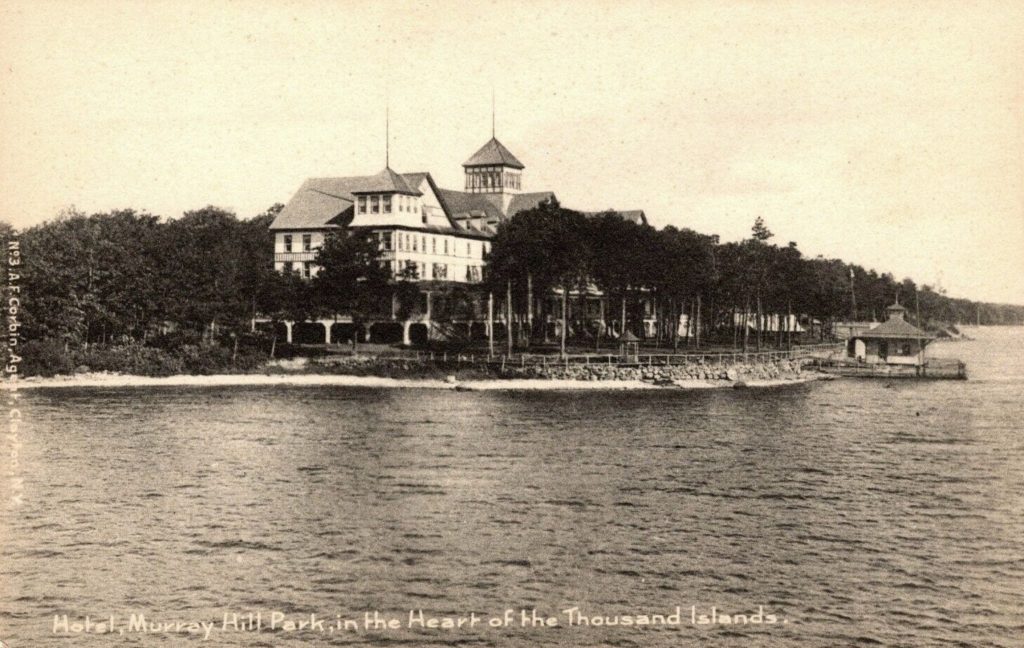
During the past week the proprietors of the Murray Hill hotel have been greatly annoyed by the arrival there of large quantities of goods. At first they did not know for whom they were, but the subsequent consignments were billed to “Riker’s Murray Hill Hotel,” and the younger Mr. Riker was found to be responsible.
Riker has been acting strangely for several days. The story of his conduct was told in a letter to Mr. Adams from George Vester, a clerk in the lawyer’s office, who is spending the summer at the Murray Hill Hotel.
Mr. Vester said that one night upon Mr. Riker’s return from New York he seemed to believe that the public thought him mentally affected, and so had caused to be printed a large number of posters, bearing a statement to this effect: “The reports about William B. Riker are untrue and without foundation. He is perfectly sane.” These are posted all over the island.
When he arrived at Thousand Islands from New York last Saturday night he had with him about $1,000 worth of fireworks, which he set off. Previously he had had about 150 expensive field glasses sent to the hotel for the use of the guests. When he left the hotel for New York Mr. Vester telegraphed to him on the train to call at Mr. Adam’s office. Mr. Riker wrote and filed a reply immediately, saying he would do so.
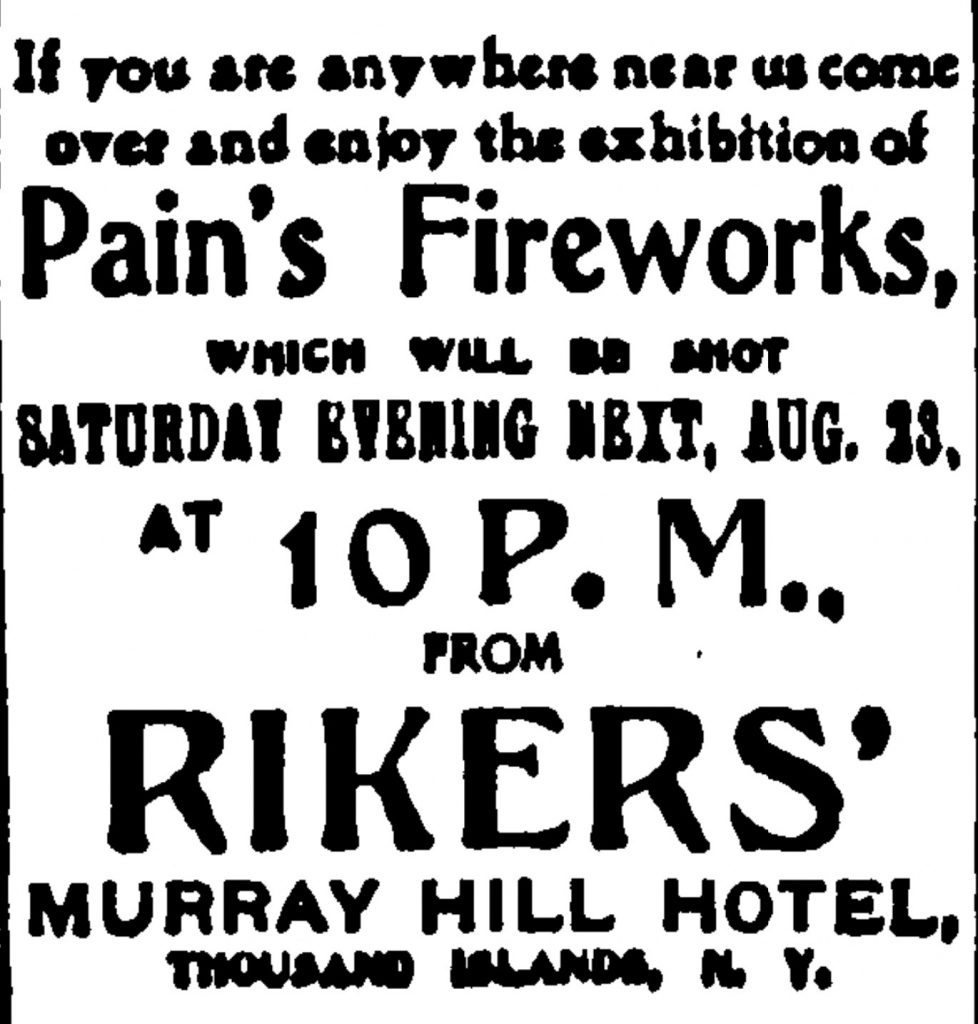
Mr. Riker arrived in New York Tuesday morning. he started for Mr. Adams’ office, but stopped to get a cigar at 175 Broadway. Next door, at No. 177, is the drug store of Leo Wise, and over its door a large “selling out” sign. Mr. Riker went in and offered to by. He said he would pay $10,000 for the entire stock, according to Mr. Adams. Leo Wise talked with him, and said he would consider the offer. Mr. Wise had almost decided to accept the offer of another man and had made out a bill of sale, which had not been executed that lay on a desk.
Mr. Riker decided to buy the store anyway, and leaving a check for $1,000 seized the bill of sale and continued on his way to the office of the attorney. Mr. Wise ran after him trying to recover the bill of sale, but Mr. Riker would not give it up until he reached Mr. Adams’ office.
Mr. Adams informed Mr. Riker’s father of his son’s condition by wire, and received a telegram instructing him to have him committed. Detective Walsh of the Old Slip Police station made the arrest, and the man was taken before Magistrate Flammer. He was exhausted when taken into custody. Mr. Adams said that it was evident that he had worked incessantly and without sleep over the details of the task he had undertaken.
Soon after William B. Riker turned over his drug store to his son several years ago, the latter developed the mania for buying. Among other things he purchased a mansion on Riverside Drive for $110,000, although he had no money with which to pay for it. A few days after that transaction the firm, which had made a considerable fortune for the father, went into bankruptcy. Since then the son lived with his father at 222 West Twenty-Fourth Street. His wife obtained a divorce soon after his first attack. The younger Mr. Riker has three children.
